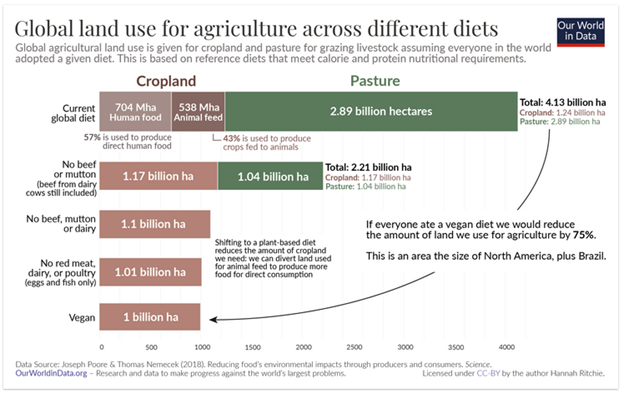this post was submitted on 01 Sep 2024
52 points (85.1% liked)
Data is Beautiful
1014 readers
26 users here now
Be respectful
founded 3 months ago
MODERATORS
you are viewing a single comment's thread
view the rest of the comments
view the rest of the comments

I suppose this doesn't take into account more humane animal farming? Like not keeping a million chickens and three long barns? Or pigs with a livable space?
The thing with pigs is: they eat a metric fuck-ton, so a lot of that land usage is to grow grain for feed.
That’s the vegans’ main point – we grow food to feed it to our food.
pigs are mostly fed crop seconds or other waste product. it's just not true that we are growing food exclusively for pigs.
This doesn't look like scraps to me.
the soybean meal is literally the byproduct of pressing soybeans for oil.
Byproduct does not equal waste product. Plastic is a byproduct, so is gasoline. Your conflating the ideas.
it would be waste if we didn't have a use for it
The use predates the creation of it. There had already been a use for it the moment it was made. It has never once been considered a waste product except in the style of argument you are making right now.
the use can't predate it's creation. that's not how linear time works.
Yes, although I suspect we'd actually make less soy oil without the demand for feed. I'm honestly not even sure what it's used for; most of the vegetable oils on sale where I live are different.
The corn case is pretty unambiguous. DDGS is a byproduct, white grease is probably a byproduct (maybe of pigs, which is "fun"), the rest looks purpose-made but isn't relevant here.
i don't know how we could prove this.
It's the perpetual problem in economics, right? That's fine though, I think I've made a reasonable case, and this isn't a court trial with an explicit standard of proof.
you don't feed pigs corn that you could sell to humans. there is a reason it ended up in the barnyard instead of the grocery store.
Yeah, you specifically plant feed corn, instead of grocery-type corn. Also why stealing corn cobs off the roadside can backfire.
field corn is also used in ethanol production, and the stalks and cobs become fodder, which, yes, is also feed, but it's a highly efficient use of the plant and land, given the outputs.
Sure, but you could also grow food corn, so it's not really a flaw in this graph.
I don't think you could grow sweet corn at the same volume/efficiency. if you could, why wouldn't you? it's more valuable per pound
Now, I'm not actually a farmer, but I suspect you're right. You can sell field corn, probably for a similar amount per hectare as food corn, because people will turn around and pay a much higher amount for animal products derived therefrom.
In the scenario presented here that's basically wished away. The amount of ethanol we use compared to feed has got to be small, so I'm guessing that's how it all works.
If we all switched to biogas that wouldn't be true, but electric has won the green power race decisively.
Gasoline is 10% ethanol. E88 is 15% ethanol. The EIA estimates that we use 376 million gallons of gasoline per day in the USA. That's 37 million gallons of ethanol, minimum, per day.
I'm going to paste from a comment I made the other day:
Hmm. I forgot about the admixture into fossil fuels, good point. It makes me wonder if there really is no good alternate use for the byproducts, other than animal feed. Biodiesel is one possibility, although I'd have to research the economics of it at this point in technological development.
The top reply there is "it's mixed", which is fair. Some places you have farmers growing alfalfa on good food land, which I personally see. Other places you have livestock grazing on semidesert - there really is no obvious alternate use there, until we run short on actual desert to build solar in.
and you have lots of corn for vegan food products, and the chemical industry, and biogas production, and much more.
Yeah, that would make it even worse. I'm not sure by how much though, because like the other person said this is representative of cropland.
They still haven't figured out a way to humanely slaughter animals let alone keep them in fulfilling environments that would be impossible to tell from their wild counterparts.
We can't afford to let animals live full lives. Pigs are butchered at 6 months but can live decades naturally.
We haven't even begun to approach the conversation of maybe possibly being able to in the maybe distant future being able to consider a humane way to keep animals and then also harvest meat from them when they pass.